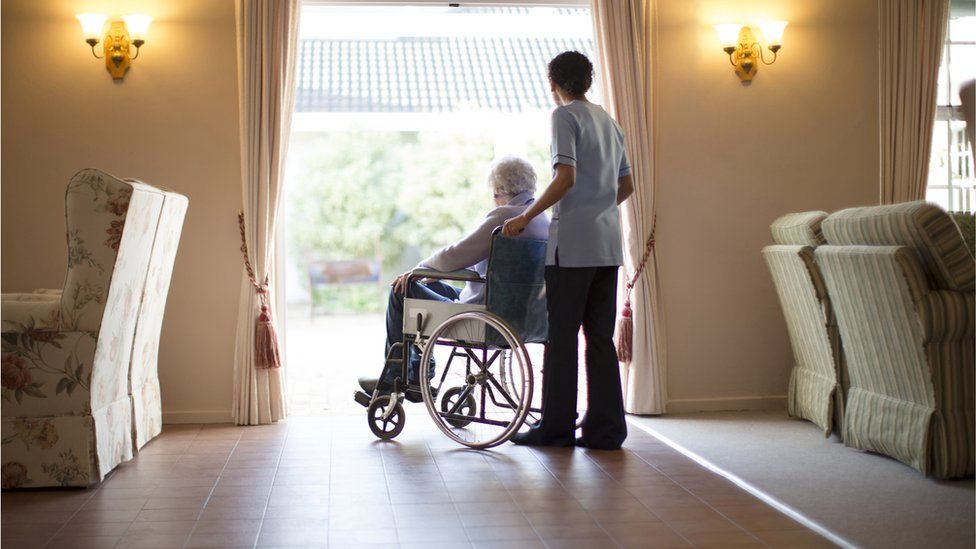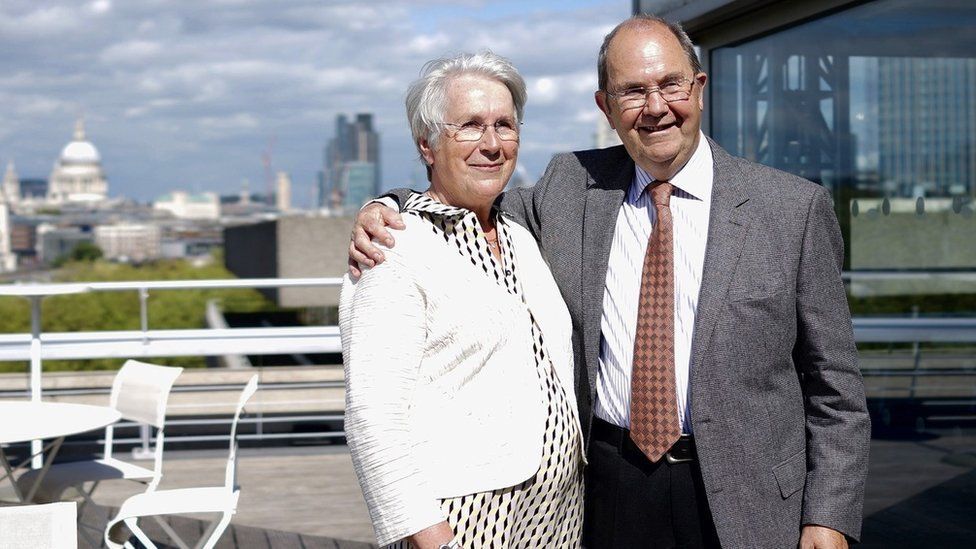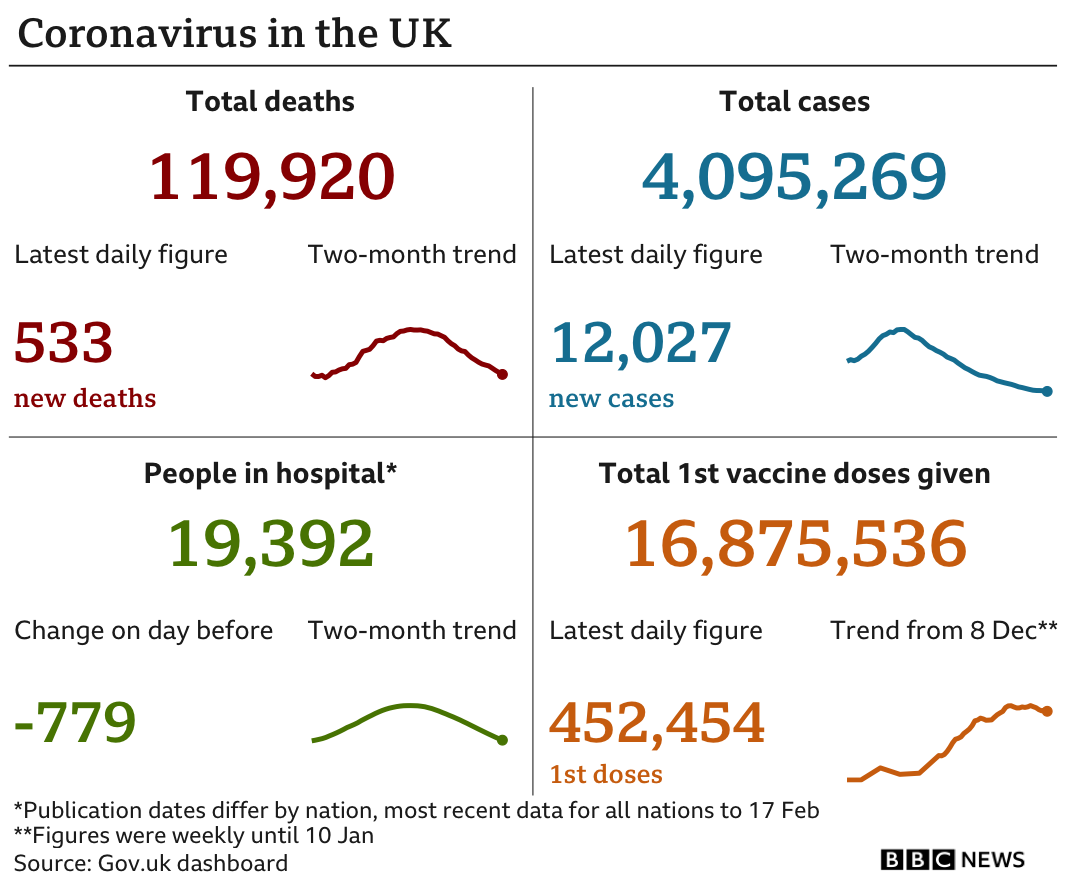
Care home residents in England will be allowed to pick one person to visit them regularly from 8 March, in the first confirmed easing of lockdown since its reintroduction last month.
They will be able to meet indoors and hold hands - but visitors must wear PPE and be tested before entering the home.
Health Secretary Matt Hancock said the rule change was a "first step to getting back to where we want to be".
PM Boris Johnson will reveal his road map for easing lockdown on Monday.
Schools are the top priority of any easing, the BBC's political correspondent Nick Eardley said, with Downing Street still hopeful that they can reopen on 8 March.
He added that this is likely to be followed by more outdoor socialising, with No 10 said to be focusing on allowing people to safely reunite with family members.
The PM is spending the weekend finalising those plans.
New data is expected to suggest vaccines have cut transmission rates.
But the latest NHS England data shows that three in 10 care home staff have not received their first coronavirus vaccine, despite being in the top four priority groups for a jab.
Every care home resident in the UK has now been offered their first vaccination.
In addition to the new rule for care homes, outdoor visits - as well as those inside pods or behind screens - will be able to continue.
The government said the new measure, which follows advice from the deputy chief medical officers and Public Health England, is the next step towards normal indoor visits resuming.
Mr Hancock said he was pleased people would soon be "carefully and safely reunited with loved ones".
"This is just the first step to getting back to where we want to be," he said. "We need to make sure we keep the infection rate down, to allow greater visiting in a step-by-step way in the future."
Liz Kendall, shadow minister for health and social care, said families had been calling for the resumption of care home visits - made safe with access to personal protective equipment and testing - for seven months.
"Over this period, ministers have repeatedly failed to grasp how important families are for the physical and mental health of care home residents, and the appalling impact preventing visits has caused," she said.
In Scotland, care home residents will be allowed up to two designated visitors once a week, under Scottish government guidelines due to be published on Wednesday.

'It's too late for my wife'

Michael Blakstad says the new visiting rules have come "too late" for his wife Tricia, who has Alzheimer's disease and lives in a care home in Hampshire.
Since moving into the care home last July, Tricia has only been able to see visitors who wear face masks and for a short period of time over a fence, Michael told BBC Radio 4's Today programme.
He believes the restricted visits, combined with periods of isolation, with no contact other than her carers, has led to her Alzheimer's deteriorating much faster than it should have done.
As a result, Tricia has gone beyond the point where the new visiting provisions would make a meaningful difference, Michael says.
"It's far too late for Tricia now. Two or three months ago, Matt Hancock promised on your programme that every care home would have this testing by Christmas, it didn't, the home Tricia's in never adopted it, and I think it's too late.
"It would have made a difference to us and it will make a difference to new people who come in now, so that's to be thanked for, but it really should have happened a lot earlier... Tricia has passed the point of no return I'm afraid."

Chief nurse for adult social care Prof Deborah Study said while she knew people wanted to "hug and kiss their loved ones", that could put lives at risk so they had to follow the rules.
She added: "We all hope to be able to take further steps in the future."
James Tugendhat, chief executive of HC-One, Britain's largest care home provider, said the move was "welcome news" for families and colleagues.
He told BBC Radio 4's Today programme: "Visiting is obviously a fundamental and necessary part of care home life and we certainly feel very ready now for visiting to resume, with lateral flow testing, with vaccination, with PPE, with infection control."
While only one named person will be able to make the visits, care homes will have the discretion to allow more than one visitor in exceptional circumstances. Full details on the plans will be given before 8 March.
Nadra Ahmed, executive chair of the National Care Association, said she understood how difficult it would be for families to select just one nominated visitor, but it was about "mitigating risks", adding that it could be "up to the resident sometimes to nominate that person".
She told BBC Breakfast that the biggest issue for care homes would be having enough staff to manage testing and extra cleaning.
"Staff resource is our biggest problem," she said. "We have staff who are exhausted, we've got staff who are going down with Covid and also getting long Covid.
"We have no insurance in our services for Covid-related risks - that still hasn't been sorted out by government in any way, so there will be all sorts of things about mitigating risks, but the default is we want to enable this visiting."
Mike Padgham, chairman of the Independent Care Group, warned there must be "a note of caution" because Covid has not gone away, and called for further clarity on the plans.
He said: "We need some clarification - for example, the announcement says holding hands will be allowed but warns against 'close contact'. How is that going to be possible? There is going to have to be some very close but compassionate supervision of these visits."

The devolved nations of the UK have the power to set their own restrictions, and have been moving at different speeds:
- In Scotland, the government hopes to publish a route out of lockdown next week, but First Minister Nicola Sturgeon has urged people not to book Easter holidays
- In Wales, First Minister Mark Drakeford has announced up to four people from two different households can exercise outdoors together from Saturday; he said he hoped the "stay-at-home" requirement could end within three weeks, with some non-essential shops and hairdressers possibly reopening at the same time
- Northern Ireland's health minister has played down the prospect of restrictions being eased in time for Easter - a review of current measures will take place on 18 March
Office for National Statistics data shows that coronavirus infections are continuing to decrease around the UK - but experts have warned that infection levels remain high, with about 553,000 people identified as having the virus.
On Friday, it was announced that another 533 people had died within 28 days of a positive test, bringing the UK's total by that measure to 119,920.

- VACCINE: When will I get the jab?
- NEW VARIANTS: How worried should we be?
- COVID IMMUNITY: Can you catch it twice?
- LOOK-UP TOOL: How many cases in your area?




Does your relative or loved one live in a care home? Share your experiences by emailing haveyoursay@bbc.co.uk.
Please include a contact number if you are willing to speak to a BBC journalist. You can also get in touch in the following ways:
- WhatsApp: +44 7756 165803
- Tweet: @BBC_HaveYourSay
- Upload pictures or video
- Please read our terms & conditions and privacy policy
If you are reading this page and can't see the form you will need to visit the mobile version of the BBC website to submit your question or comment or you can email us at HaveYourSay@bbc.co.uk. Please include your name, age and location with any submission.
https://news.google.com/__i/rss/rd/articles/CBMiJmh0dHBzOi8vd3d3LmJiYy5jby51ay9uZXdzL3VrLTU2MTMzMjkx0gEqaHR0cHM6Ly93d3cuYmJjLmNvLnVrL25ld3MvYW1wL3VrLTU2MTMzMjkx?oc=5
2021-02-20 10:12:31Z
52781389427895
Tidak ada komentar:
Posting Komentar